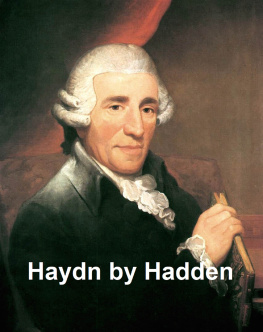Never the Hope Itself
Love and Ghosts in Latin America and Haiti
Gerry Hadden

For Mouche and Lula and Nino and the boy
and to the crooks, cranks, saviors, and saints of Latin America and the Caribbean
Contents
R on and I were hurtling down Haitis National Highway 2 when his beat-up red Cherokee Blazer came to a sudden, shuddering stop. My forehead bounced against the front windshield. We both jumped out of the truck and cursed. It was getting dark and I couldnt afford to be outside the capital any longer.
From the dusty ridge we could see the cruel and crowded slums of Port-au-Prince on the horizon below, simmering like a coal fire against the blue-green sea. Haitis NH2 was officially a highway, but it looked and felt more like a dry riverbed. Potholes deep enough to entrap cars pocked its surface. There were no guardrails between us and rocky oblivion on most of the curves as we descended from Haitis Central Plateau toward the capital. On some stretches the road narrowed to such a degree that traffic could move only in one direction. Often that meant yielding to giant, swaying Korean-made cargo trucks overflowing with Haitian laborers on their way to or from the fields and the few factories that were still operational in that country run nearly into oblivion. But when Rons Cherokee broke down that late May afternoon we were alone on the mountainside.
After hours of jarring journey the trucks driveshaft had finally broken, detached from the front axle, then embedded itself like a jousters lance into the stony road. Ron tried hammering it free with a rock. The first one broke in two.
Here, I said, handing him another. A bigger one.
But it was useless. The weight of the truck held the driveshaft fast in the ground. Ron shimmied out from under the truck and fished a small crowbar out of a toolbox and set to work banging again. After several minutes we climbed back into the vehicle.
Im going to call Triple A, I said. I knew the joke was bad but I was nervous. Id slipped out of Port-au-Prince just two days after legislative elections and the results were still not in. Things were tense in the capital; some fifteen people had been murdered in pre-election violence. In the last week several small bombs had been set off, and everyone was braced for more trouble. But when an Organization of American States election official told a group of us reporters that the final tally would be delayed at least another few daysballots from the deep countryside were still arriving on the backs of donkeysI decided to take a chance and slip away to gather tape for another story. This was my first assignment abroad for National Public Radio and my pulse was ticking a few beats per minute above the recommended rate for a man of my age, thirty-three. The attacks of September 11 were still more than a year away and Americans and the American government were paying close attention to this tiny but potential tinderbox of a country. Our audience was huge and interested and I was the untested new guy.
Ron was walking in a big circle, holding his phone over his head. No coverage, he said. Damn it damn it damn it. Then he pocketed his phone and clenched his fists and said confidently, To plan C!
Plan C apparently consisted of going back to plan A because he slipped back under the truck and resumed his hammering. I stayed in the cabin replaying the sounds of a small sugar mill crushing freshly cut cane. The juicy squeak of the metal press, the sucking plod of the gray horse turning the mill in muddy circles. The laughter of children as sap ran and the man with the microphone winked. The mill was at the heart of a short piece on rural cooperatives that I hoped would shed a more positive light on Haitians and their efforts to lift themselves out of poverty. Nearly every Haitian I had met so far had implored me to do a positive story about the country. We journalists were always reporting the bad news.
I had my headphones on but I could still hear the clang of Rons crowbar against the driveshaft like the distant call to supper on some cowboy ranch. Then I heard what I thought was a sort of yelp. The truck lurched forward and began to roll down the steep incline.
Through the open drivers side door I saw Ron rolling out from under the Cherokee, kicking up a cloud of white dust. Apparently hed freed the driveshaft. But hed forgotten to secure the trucks emergency brake. I was sitting in my tangle of cables, microphones, and minidiscs and the emergency brake was on the far side of the cabin, low to the floor, too far for my foot to reach it in the short moment I had to react. As the truck picked up speed I chucked myself out my door. I dragged half my gear with me and landed prone on the gravelly ground. My headphones were still strung around my neck and the cable quickly went taut; it must have become caught on some part of the truck. Without thinking I grabbed fast to the headphones and was promptly rolled over. The cable snapped and boomeranged back in my face. I stood up in time to watch our wounded red vehicle bounding toward the next downhill curve in the road, now doing about twenty miles an hour and gaining speed, its perverse-looking driveshaft scraping along the road. When it reached the curve I bid a hasty good-bye to a weeks worth of recordings still scattered across the floor of the trucks cabin. But then the Cherokee struck a huge rock on the edge of the precipice and its front end shot up in the air. The steering wheel spun hard toward the mountain, and when the wheels touched down again the truck lurched back across the road and smashed into the rocky mountainside, coming to a stop on two wheels. Ron and I ran down the hill.
Fuck me, Ron said, that was lucky.
You got any cigarettes left, I said. I didnt smoke. I quickly gathered my gear from the floor of the truck. We walked over to the big boulder that had saved Rons truck and probably us as well and sat down on it. The sun was dropping, the gray stain of the city in the distance darkening now. If I ever go to grad school Im going to study cable management, I said, untangling the wad of wires at my feet. Ron had grown morose.
I guess were walking home, I said.
Are you kidding? Ron said, sitting up straight and taking a drag on his cigarette. In his white undershirt and with white dust covering his face and mustache he looked like a baker on a smoke break. We cant walk down this mountain. After dark its filled with bandits.
Bandits?
Weve got to get the truck moving. If we leave it behind theyll strip it and torch it.
And us?
Ron ignored the question. The trucks prognosis had worsened. In the crash the rear axle had slipped out of alignment a couple of inches. We managed to get the driveshaft back in position, but we couldnt secure it. Ron started his hammering again. It was the only sound on the entire mountainsideclang, clang, clang, clang. Then some young Haitian men came walking around the bend in the highway, shirtless and bony, and helped us push the truck more or less back onto the road. One of them, a severely bucktoothed kid with long lanky limbs, had an idea: we should start the truck, drop it in reverse, and ram it tail-end into a boulder thus forcing the rear axle forward and the driveshaft back into its socket.
Why not? Ron said.
Six of us pushed a big rock into the road behind the truck and Ron slammed the Cherokee against it in reverse. It cracked the bumper but the rear axle shifted forward again and the driveshaft jammed back in place, at least temporarily. When Ron saw that it had worked he smiled at the Haitian kids ingenuity. He said something to the boys in Kreyol and tipped them some gourdes for their trouble. The boys skipped and disappeared up the road. We were at least an hour from any village, and I wondered where on earth theyd come from and where they were going.
Next page










